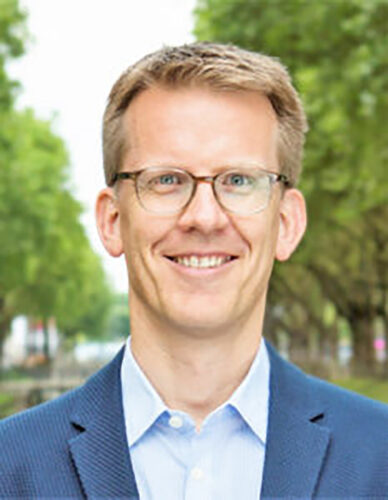
Dr. Kusch, apps such as “Skill Hero” promise to further develop leadership skills via smartphone: definition of goals, behavioural triggers, and performance evaluation. Is it actually possible to train good management skills by using the algorithmic logic of a fitness app?
Dr. René Kusch: Well, there is a little more effort required than just using your smartphone. If you expect that such an app turns you into a project management virtuoso or a top seller within a few weeks, then you can likewise expect from a fitness app to make you a marathon runner. None of this will happen.
This example, though, nicely shows the expectations that are often projected onto digital tools today: obtaining simple solutions to complex problems. However, things will not work out like this as every tool, whether digital or analogue, must function in a very specific context.
And it is certainly even more difficult for a manager to build up a successful team than to develop muscles…
Dr. René Kusch: Exactly. In both cases, it should be differentiated between the method applied and the goal to be reached. The methods of digitalization, whether apps or cloud applications such as Office 365, Doodle, Slack, etc., are just tools. Many self-proclaimed digitalzation and transformation experts, however, suggest that using them leads to a more agile organization – such as faster responsiveness, better and more accurate learning skills, or a more effective exchange of knowledge. Much more is needed, though, namely knowledge about learning cultures and, in particular, understanding the principles underlying learning processes.
However, there are also many examples of successful managers who have been able to establish completely new leadership and working cultures in their teams, for example with social collaboration tools or Skype meetings. In your opinion, what is it that they do better compared to those, who fail with their attempts?
Dr. René Kusch: One success factor certainly is not positioning the application of tools as an end in itself but as a catalyst for the individualization of development processes. With digitalization, the detailing level of data increases which means that more and more accurate, “granular” information about skills, preferences, behaviours and patterns of action are obtained.
Management pioneers are taking two elements into account that, like two sides of a coin, cannot be separated. First, this “granularity” has to be used to evaluate and develop my leadership qualities. Second, the development of employees does not happen in a vacuum, but, as already mentioned, in the context of organizations. It is critical to have those employees in mind, who are not opposed to changes per se, but who are insecure in dealing with the new methods. Otherwise, there is a risk of unnecessary resistance to organizational changes.
In this context, the term “VUCA” is often used. What does it refer to?
Dr. René Kusch: The acronym VUCA stands for volatility, uncertainty, complexity and ambiguity. Changes are happening faster, cause-and-effect relationships are becoming more complex, and it is getting more difficult to predict the consequences that employees will experience. Accordingly, VUCA has now established itself as a buzzword or description among managers, indicating that organizational changes have reached a new quantity and quality.
My impression is that VUCA is often used just as a trendy term, similar to “agility” …
Dr. René Kusch: Yes, although the term is highly appropriate, its inflationary use unfortunately causes some problems. Just commenting on opportunities and risks of disruption, pressure to change and complexity is easier than specifying what this means for the company or for one’s own development. In this vein, the buzzwords of digitalization are not different from buzzwords that have been used in an inflationary way in the last decades in the fields of business and coaching. However, there are still serious opportunities to positively change organizations over the long term.
Beyond that, an inflationary use does not automatically invalidate the meaning and purpose behind those buzzwords. Let us stick with the example of “agility”: This assumes a long-term planning horizon based on the understanding that traditional patterns and rules are no longer effective in complex contexts and that a change is unavoidable. For example, when new competitors enter the market or customer requirements change.
What do you recommend to managers who have come to this conclusion?
Dr. René Kusch: They should take the time to consider and analyse their routines, standards and mindsets. This is the only way to decide which of them will continue to be effective in the context of the new challenges and where new approaches are needed at all. This also minimizes unnecessary changes, which sometimes are ad-hoc reactions in order to proof to oneself and others “agility” although changes are not necessary. In any case, changes should only be introduced where the new goals are at least worth the transfer costs.
In exchanges with managers, we regularly experience how this reflection leads to understanding the need for change at its core. This is important to boil down organizational change to their most relevant and keep doing what continues to be efficient and also effective.
How executives should deal with these challenges and how “VUCA” and “agility” impact their role and competencies will be discussed in the second part of the interview with Dr. Ing. Kusch: “Self-Awareness is dead”.

Dr. René Kusch is the owner of RELEVANT Management Consulting. He consults organizations in talent identification, selection and leadership development. With evidence-based methods and on the basis of many years of expertise working with managers and their teams, Dr. René Kusch has developed solutions which are pragmatic and effective in the long term. RELEVANT is an official distributor for Hogan Assessment Systems.
